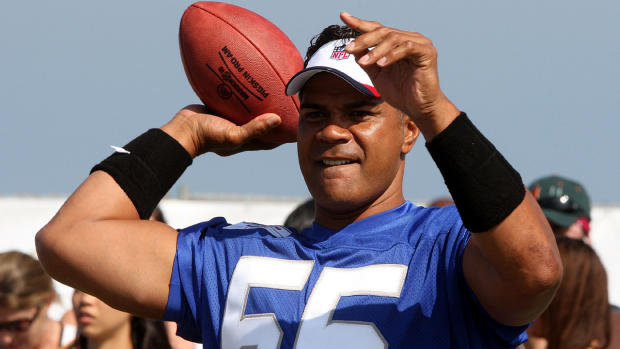NFL retirees more likely to have depression and cognitive problems, brain study shows
A new study of NFL players adds to the evidence that repeated head blows absorbed during a football career could lead to changes in the brain that affect the athletes' behavior.
The study, published Jan. 7 in JAMA Neurology (formerly known as the Archives of Neurology), found retired NFL players were more likely to report cognitive impairment and depression and show physical brain changes on an MRI scan compared to healthy individuals.
"NFL players may be more likely to develop cognitive impairments (problems with memory, naming and word finding) or depression as they age compared with the general population," wrote the authors, led by Dr. John Hart Jr., medical science director at the Center for BrainHealth at The University of Texas at Dallas.
Suspicions of a link between hard hits to the head and depression have grown in recent years following the suicide deaths of former NFL players including Dave Duerson, Ray Easterling and Junior Seau.
Repeated blows to the head and a history of concussions have also been linked to depression and dementia-like behaviors in NHL playersand soldiers who return from combat with a traumatic brain injury.
Several of these people developed memory loss, major depression and other Alzheimer's-like symptoms at relatively young ages, then following their deaths, brain scans confirmed evidence of a type of brain damage called chronic traumatic encephalopathy, or CTE.
CTE has been confirmed on autopsy in several athletes, including Duerson and Easterling.
The new study involved 34 retired NFL players, average age of 62, who underwent neurological and neuropsychological tests. Twenty-six of them underwent detailed brain scans, and were then compared to brain scans of healthy individuals. All but two had suffered concussions during their playing careers.
Of the 34 retired pro football players, 20 were considered cognitively normal. As for the rest, eight were diagnosed with depression, eight reported mild cognitive impairments, four reported fixed cognitive deficits and two had dementia.
Those who were cognitively impaired had trouble with tests for naming, word finding, and both visual and verbal tests for episodic memory, which is the ability to remember past experiences or people.
Brain scans of 26 of the athletes found those who showed cognitive impairment and depression had "significant differences" in their brain's white matter. White matter in the brain contains nerve fibers that affect how the brain processes and sends information. The scans also showed NFL retirees who were cognitively impaired had differences in blood flow to areas of the brain associated with cognitive deficits, including those that control for memory and word finding.
"Not everyone gets this problem," Hart told Reuters, noting many players suffered concussions but not everyone in the study had these symptoms. "It's a more complex issue than has just sort of been thrown out there."
An NFL representative told Reuters the league would share the report with members of its Head, Neck and Spine Committee.
In an accompanying editorial published in the same journal issue, Drs. Ramon Diaz-Arrastia and Daniel Perl of the Uniformed Services University of the Health Sciences in Bethesda, Md., wrote that the issues raised by Hart's study merit further attention.
They note because symptoms of CTE include irritability, depression and cognitive problems, better tests and imaging scans are needed to improve the accuracy of diagnosis during the lifetime of an individual with CTE, as opposed to after death when they are currently diagnosed.
"Of particular concern is the possibility that...repeated mild traumatic brain injuries (MTBIs) are not limited to professional football players but may also occur in amateur collegiate athletes and even adolescent and younger players," they wrote.
Last month, a study in the Dec. 12 Journal of Neuroscience found changes in white matter in brain scans of kids who had suffered a recent concussion.
- Junior Seau's death raises questions about brain trauma, chronic traumatic encephalopathy
- Major study of athletes' brains links head injuries to brain damage
- NFL widow gives voice to "quiet hero" Ralph Wenzel
Dr. Michael G. McKee, a clinical psychologist at the Cleveland Clinic who has consulted with athletes and sports teams, said the study adds new evidence that repeated blows to the head may cause problems after an athlete's playing days that could trigger depression.
"Getting cognitively impaired can be a depressing circumstance, so it's not unlikely they are linked," said McKee, who was not involved in the research. He thinks the NFL is going in the right direction by enforcing rules against helmet-to-helmet hits, and levying fines and suspensions on people.
However, he adds that simply retiring from the NFL could also contribute to depression in that athletes feel a void following their playing days. They often go from being recognized and idolized for their athletic ability by fans or lauded by coaches and teammates for their play, to a life in which they are no longer valued by others and have to rely on themselves once they're out of center stage.
"It's often a depressing adjustment," he said.
